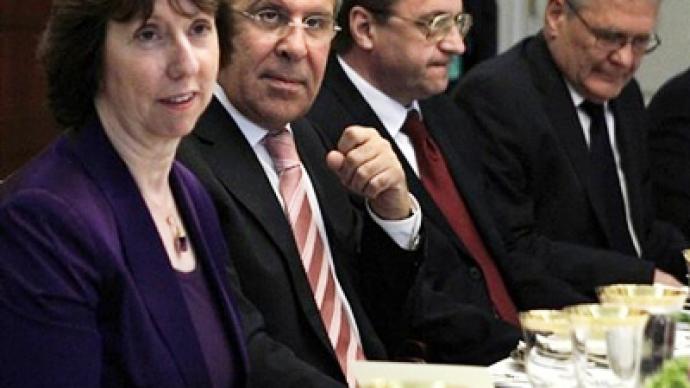As Quartet on Middle East talks, will the Palestinians walk?

Russian Foreign Minister Sergey Lavrov is in Washington for a meeting of the Quartet of Middle East Mediators to help restart Israeli-Palestinian peace talks before a possible unilateral move to independence by the Palestinians in September.
Lavrov's visit, scheduled from July 11-13, is packed and will include discussions on European missile defense and Russia’s accession to the World Trade Organization. Most pressing, however, will be talks on Middle East peace.Observers fear the Palestinians, who are watching the territory of their future state become a construction zone for new Israeli settlements, have lost hope in the peace process. Thus, they may be willing to risk a vote in the United Nations on a resolution recognizing Palestinian statehood.Foreign Minister Lavrov is working to avoid this scenario together with US Secretary of State Hillary Clinton, the EU High Representative for Foreign Affairs and Security Policy Lady Catherine Ashton, United Nations Secretary-General Ban Ki-Moon, and former British Prime Minister Tony Blair.Lavrov reiterated Russia’s commitment to a two-state solution to the Israeli-Palestinian standoff, which has been an elusive goal of the international community since the conclusion of the Six-Day War in 1967."Russia is vitally interested in getting things (the negotiating process between Israel and Palestine) moving," the Russian foreign minister said at a meeting with senior Palestinian negotiator, Nabil Shaath, on the eve of the talks. "We shall keep to this position at the ministerial meeting of the Middle East Quartet.""We hope solutions (from the ministerial meeting) will help resume the negotiating process aimed at the creation of an independent democratic Palestinian state that will live side by side with Israel," Lavrov added.Meanwhile, Russian Deputy Foreign Minister Mikhail Bogdanov told Itar-Tass in an exclusive interview that the mediators share the opinion that "dramatic events in the Middle East and North Africa should not serve as an excuse for delaying the resolution.”"The main problem is to find comprehensive, fair and lasting solutions to the Arab-Israeli conflict," he said.At this point, Bogdanov made reference to what promises to be the most perplexing talking point in the negotiation process: the boundaries of any future two-state deal.The resumption of talks is aimed at "creating a Palestinian state within the 1967 borders with the agreed territorial exchanges and full pullout of the Israeli troops from the occupied territories," Bogdanov said."Of course, Israel's security should be reliably ensured," he added.The Russian diplomat also mentioned other areas of contention in “final status issues,” including the official status of Jerusalem, which the Palestinians foresee as their future capital, the right of return for Palestinian refugees who fled the country during the 1967 war, and even access to dwindling water supplies.In May, US President Barack Obama received something of a rebuke in the Oval Office of all places, when Israeli Prime Minister Benjamin Netanyahu said he would reject any peace plan that forced Israel to revert back to pre-1967 borders.Netanyahu then took his message to a gathering in Washington of the American Israel Public Affairs Committee (AIPAC), a powerful pro-Israeli lobby."We can only make peace with the Palestinians if they're prepared to make peace with a Jewish state," Netanyahu told the gathering. "Israel can not return to the indefensible 1967 lines."Some observers say Netanyahu’s argument over the “indefensible 1967 lines” lacks veracity. After all, the Israeli Defense Forces did not find the 1967 lines indefensible. Indeed, Israel, which launched a preemptive attack on June 5, 1967, emerged victorious against a collective force of Arab countries, including Egypt, Syria, and Jordan.Furthermore, Obama placed a lot of political capital in finding a solution to the Middle East crisis before the end of his first term. And with presidential elections set for next year, he may not get a second chance. But securing a permanent peace between Israel and the Palestinians would certainly give America’s first black president a lot of ammunition on the upcoming campaign trail.In his now-famous Cairo speech, which he delivered shortly after becoming president, Obama provided his vision for peace between Israelis and Palestinians:“For decades, there has been a stalemate: two peoples with legitimate aspirations, each with a painful history that makes compromise elusive. It is easy to point fingers – for Palestinians to point to the displacement brought by Israel's founding, and for Israelis to point to the constant hostility and attacks throughout its history from within its borders as well as beyond….“That is in Israel's interest, Palestine's interest, America's interest, and the world's interest. That is why I intend to personally pursue this outcome with all the patience that the task requires.”If Obama senses that he will fail to reach these elusive goals, he may be tempted to accept a Palestinian declaration of independence in the United Nations as a partial victory. Although such a prospect seems unlikely given the “unbreakable” US-Israeli relations, it should be remembered how tenuous relations have occasionally been between Obama and Netanyahu in the past (the best example, perhaps, was when Vice President Joe Biden was in the middle of a goodwill trip to Israel and Israeli officials announced that 1,600 new homes will be built in the disputed territories of East Jerusalem). However, Obama had also promised in his Cairo speech to shut down the infamous detention facility in Guantanamo Bay, which has been called the “gulag of our times” by one human rights group, “by early next year.”Guantanamo Bay is still open for business.Whether or not the Israeli-Palestinian conflict will continue remains to be seen, but one thing is certain, global peace depends upon it.Robert Bridge, RT












